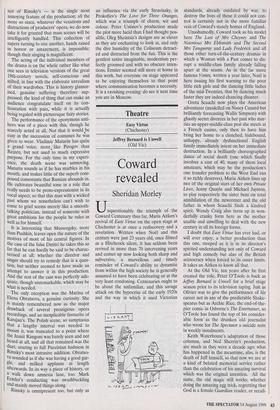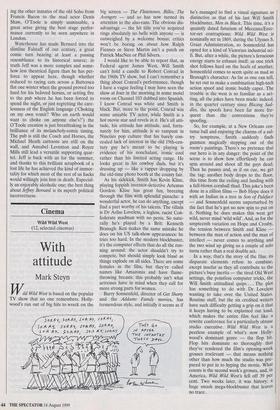Theatre
Jeffrey Bernard is Unwell (Old Vic) Easy Virtue (Chichester)
Coward revealed
Sheridan Morley
Unquestionably the triumph of the Coward Centenary thus far, Maria Aitken's revival of Easy Virtue on the open stage at Chichester is at once a rediscovery and a revelation. Written when Noel and this century were just 23 years old, once filmed as a Hitchcock silent, it has seldom been revived in more than 70 intervening years and comes up now looking both sharp and subversive, a marvellous and timely reminder of Coward's ability to dynamite from within the high society he is generally assumed to have been celebrating or at the very least condoning, Centenaries ought to be about the unfamiliar, and this savage attack on the hypocrisy of the early 1920s and the way in which it used Victorian standards, already outdated by war, to destroy the lives of those it could not con- trol is certainly not in the more familiar vein of Coward's stately homes of England.
Unashamedly, Coward took as his model here The Last of Mrs Cheyney and The Notorious Mrs Ebbsmith and The Second Mrs Tanqueray and Lady Frederick and all those other turn-of-the-century dramas in which a Woman with a Past comes to dis- rupt a middle-class family already falling apart at the seams. As in the far more famous Vortex, written a year later, Noel is here issuing his first warning to the poor little rich girls and the dancing little ladies of the mid-Twenties, that by dancing much faster they are indeed chancing disaster.
Greta Scaachi now plays the American adventurer (modelled on Nancy Cunard but brilliantly forecasting Wallis Simpson) with ghastly secret divorces in her past who mar- ries an upper-middle-class prat she meets at a French casino, only then to have him bring her home to a clenched, hidebound, unhappy, already dysfunctional English family immediately intent on her immediate destruction. In a brilliantly choreographed dance of social death (one which finally involves a cast of 40, many of them local amateurs, which may be the production's one transfer problem to the West End run it so richly deserves), Maria Aitken lines up two of the original stars of her own Private Lives, Jenny Quayle and Michael Jayston, to play respectively the sister bent on total annihilation of the newcomer and the old father in whom Scaachi finds a kindred spirit. Wendy Craig also turns up in won- derfully cranky form here as the mother unable and unwilling to deal with the new century in all its foreign forms.
I doubt that Easy Virtue has ever had, or will ever enjoy, a better production than this one, steeped as it is in its director's spirited understanding not only of Coward and high comedy but also of the British aristocracy when forced to its outer limits. It takes an Aitken to know all that.
At the Old Vic, ten years after he first created the role, Peter O'Toole is back as Jeffrey Bernard is Unwell for a brief stage season prior to its television taping. Just as Olivier was to give the performance of his career not in any of the predictable Shake- speares but as Archie Rice, the end-of-the- pier comic in Osborne's The Entertainer, so O'Toole has found the top of his consider- able form as the drunken 'old journalist who wrote for The Spectator a suicide note in weekly instalments.
Keith Waterhouse's adaptation of those columns, and Ned Sherrin's production, are much as they were a decade ago; what has happened in the meantime, alas, is the death of Jeff himself, so that now we are at a kind of belated memorial service rather than the celebration of his amazing survival which was the original intention. All the same, the old magic still works; whether doing the amazing egg trick, regretting that God is a female Guardian reader, or recall- ing the other inmates of the old Soho from Francis Bacon to the mad actor Denis Shaw, O'Toole is simply unmissable, a great actor giving the best stage perfor- mance currently to be seen anywhere in London.
Waterhouse has made Bernard into the slimline Falstaff of our century, a great comic turn bearing at least a passing resemblance to its historical source; in truth Jeff was a more complex and some- how less theatrical figure than he has per- force to - appear here, though whether reduced to racing cats across a Battersea flat one winter when the ground proved too hard for his beloved horses, or setting fire to the pub where he has been forced to spend the night, or just regretting the care- lessness of the English language (`Choking on my own vomit? Who on earth would want to choke on anyone else's?') the O'Toole creation is just breathtaking in the brilliance of its melancholy-comic timing. The pub is still the Coach and Horses, the Michael Heath cartoons are still on the wall, and Annabel Leventon and Royce Mills still lead a versatile supporting quar- tet. Jeff is back with us for the summer, and thanks to this brilliant scrapbook of a lost life he has achieved the kind of immor- tality for which most of the rest of us hacks would willingly join him in death. Especial- ly an enjoyably alcoholic one; the best thing about Jeffrey Bernard is its superb political incorrectness.



























































 Previous page
Previous page